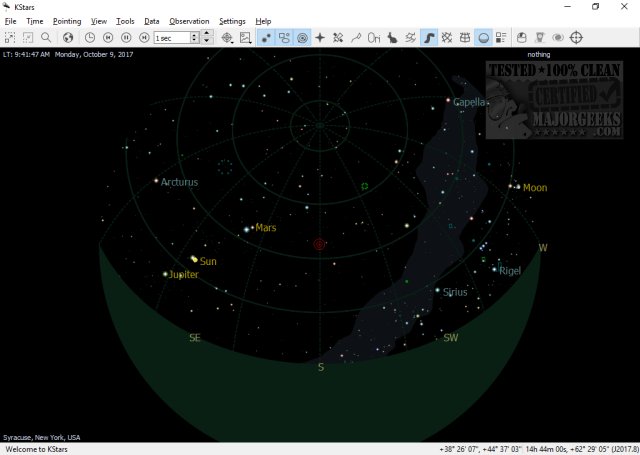KStars 3.7.6 has been released, offering users a desktop planetarium experience that accurately simulates the night sky based on their geographical location. During the initial setup, users are guided through essential steps, including selecting their location. For individuals in smaller towns, it may be necessary to choose a nearby larger city—for instance, users in Liverpool, NY, might opt for Syracuse, NY instead.
After location selection, users can download optional data files to enhance the KStars experience, including images of Messier objects and a comprehensive NGC/IC catalog. While these downloads are optional, users must select at least one to proceed, with file sizes ranging from 81MB to over 1.2GB. Once this step is complete, users can access helpful tips for navigating the software during startup.
KStars presents a steep learning curve, featuring nine file menu drop-downs and around thirty icons, which can be overwhelming for newcomers. However, hovering over icons provides descriptive tooltips, aiding navigation. A practical approach is to experiment with zooming, panning, and exploring the various icons, as this hands-on method quickly familiarizes users with the functionalities they will likely use.
In addition to its fun exploration of the solar system, KStars includes features like the Ekos profile wizard, designed for capturing images and collecting scientific data. While the software may initially seem complex, users are encouraged to dive in, as the depth of features can lead to rewarding discoveries as they become more adept at using the program.
To extend this, potential updates or future releases of KStars could include enhanced user tutorials or guided tours, making it easier for beginners to understand the functionalities without feeling overwhelmed. Additionally, integrating community-driven features, such as user forums or collaborative projects, could further enrich the KStars experience, fostering a sense of community among astronomy enthusiasts. With advancements in technology, incorporating augmented reality (AR) or virtual reality (VR) features could also enhance user interaction, making the exploration of celestial bodies even more immersive and educational
After location selection, users can download optional data files to enhance the KStars experience, including images of Messier objects and a comprehensive NGC/IC catalog. While these downloads are optional, users must select at least one to proceed, with file sizes ranging from 81MB to over 1.2GB. Once this step is complete, users can access helpful tips for navigating the software during startup.
KStars presents a steep learning curve, featuring nine file menu drop-downs and around thirty icons, which can be overwhelming for newcomers. However, hovering over icons provides descriptive tooltips, aiding navigation. A practical approach is to experiment with zooming, panning, and exploring the various icons, as this hands-on method quickly familiarizes users with the functionalities they will likely use.
In addition to its fun exploration of the solar system, KStars includes features like the Ekos profile wizard, designed for capturing images and collecting scientific data. While the software may initially seem complex, users are encouraged to dive in, as the depth of features can lead to rewarding discoveries as they become more adept at using the program.
To extend this, potential updates or future releases of KStars could include enhanced user tutorials or guided tours, making it easier for beginners to understand the functionalities without feeling overwhelmed. Additionally, integrating community-driven features, such as user forums or collaborative projects, could further enrich the KStars experience, fostering a sense of community among astronomy enthusiasts. With advancements in technology, incorporating augmented reality (AR) or virtual reality (VR) features could also enhance user interaction, making the exploration of celestial bodies even more immersive and educational
KStars 3.7.6 released
KStars is a desktop planetarium that provides an accurate graphical simulation of the night sky from Earth's location.


